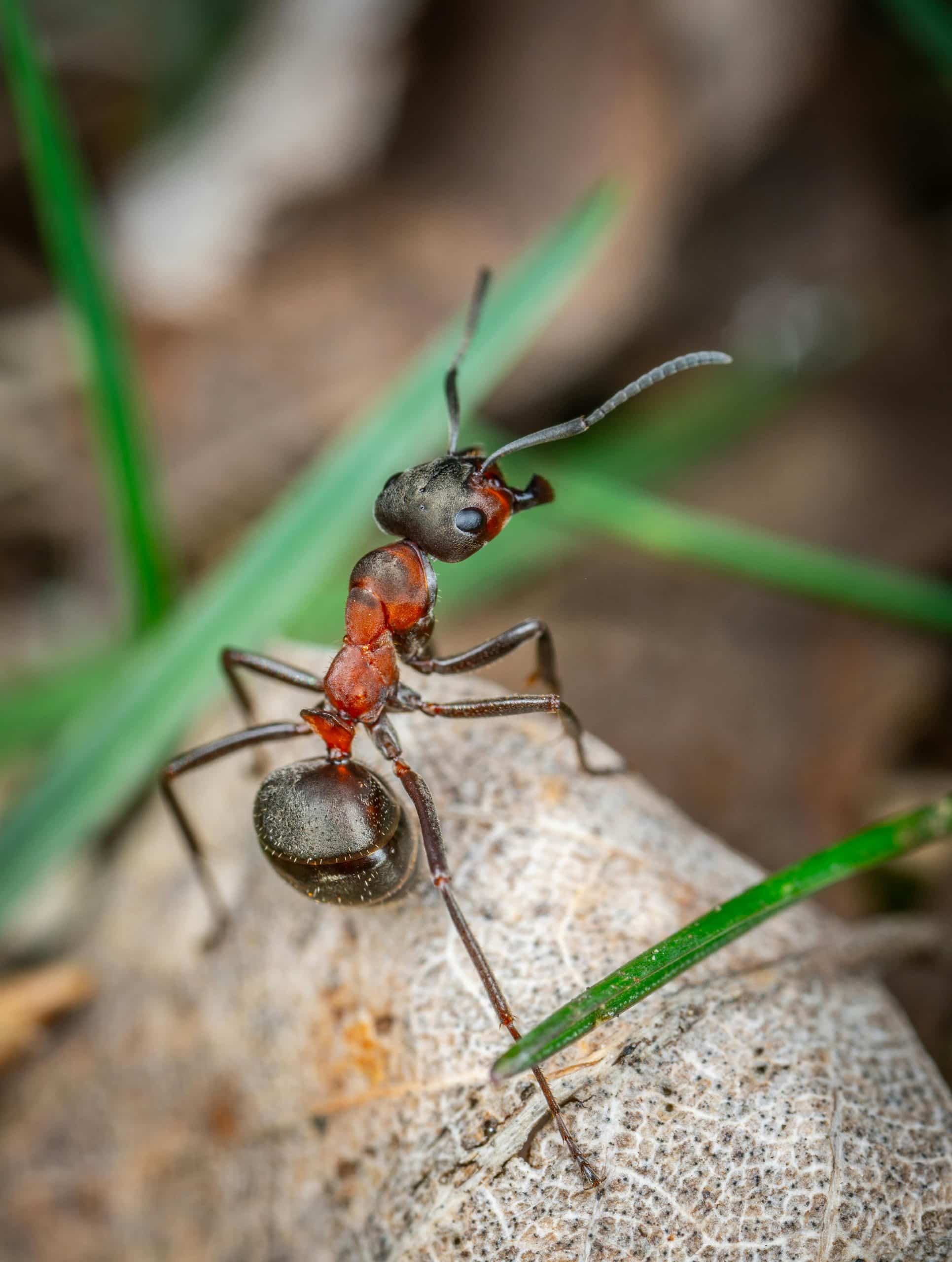Table of Contents
When Should You Be Worried About Carpenter Ants?
Carpenter ants are one of the most common household pests in North America. While they don’t pose direct health risks to humans, these industrious insects can cause significant structural damage to your home if left unchecked. But how do you know when it’s time to worry about carpenter ants? In this comprehensive guide, we’ll explore the signs of carpenter ant infestations, their potential impact, and when to seek professional help.
Understanding Carpenter Ants
Before diving into the warning signs, it’s essential to understand what carpenter ants are and how they behave. Carpenter ants (Camponotus spp.) are large ants, typically black or dark brown in color, ranging from 1/4 to 1/2 inch in length. Unlike termites, carpenter ants don’t eat wood; instead, they excavate it to create nests and galleries for their colonies.These ants prefer moist or decaying wood, making them particularly attracted to areas with water damage or high humidity. While they primarily nest outdoors in dead trees or stumps, they can also establish colonies inside buildings, potentially causing structural damage over time.
Signs of Carpenter Ant Infestation
Knowing the signs of a carpenter ant infestation is crucial for early detection and prevention of extensive damage. Here are some key indicators to watch out for:
- Visible Ants: The most obvious sign is seeing large ants inside your home, especially in areas near wood structures.
- Wood Shavings: Look for small piles of wood shavings, known as frass, near wooden structures. This sawdust-like material is a byproduct of their excavation activities.
- Rustling Sounds: You may hear faint rustling noises coming from inside walls or wooden furniture, indicating ant movement within.
- Winged Ants: The presence of winged ants, particularly in spring or early summer, could signify a mature colony nearby.
- Hollow-Sounding Wood: Tapping on wood that sounds hollow could indicate carpenter ant galleries within.
- Visible Damage: In severe cases, you might notice visible damage to wooden structures, such as small holes or tunnels in the wood.
When to Be Concerned
While seeing an occasional carpenter ant in your home doesn’t necessarily mean you have an infestation, certain situations warrant immediate attention:
- Persistent Sightings: If you consistently see carpenter ants inside your home, especially during winter months, it likely indicates an indoor nest.
- Multiple Nests: Finding evidence of satellite nests in addition to the parent colony suggests a well-established infestation.
- Structural Damage: Any signs of wood damage, particularly in load-bearing structures, should be addressed immediately.
- Large Numbers: Seeing large numbers of ants, especially winged reproductives, indicates a mature colony that requires professional intervention.
- Moisture Issues: If you have ongoing moisture problems in your home, such as leaky pipes or poor ventilation, you’re at higher risk for carpenter ant infestations.
The Impact of Carpenter Ants
While carpenter ants don’t pose direct health risks, their potential for structural damage is significant. Over time, extensive carpenter ant colonies can weaken wooden structures, potentially leading to costly repairs. In severe cases, this damage can compromise the integrity of your home’s framework.Moreover, carpenter ant infestations can be indicative of underlying moisture issues in your home. Addressing these problems not only helps eliminate the ants but also prevents future pest problems and potential water damage.
Prevention Strategies
Preventing carpenter ant infestations is far easier than dealing with an established colony. Here are some effective prevention strategies:
- Moisture Control: Fix leaky pipes, ensure proper ventilation, and address any areas of water damage promptly.
- Seal Entry Points: Inspect your home’s exterior for cracks or gaps and seal them to prevent ants from entering.
- Trim Vegetation: Keep trees and shrubs trimmed away from your home to eliminate potential bridges for ants.
- Store Firewood Properly: Keep firewood elevated and away from your home’s exterior.
- Regular Inspections: Conduct periodic inspections of your home, paying close attention to areas prone to moisture.
When to Call a Professional
While minor ant problems can sometimes be addressed with DIY methods, carpenter ant infestations often require professional intervention. You should consider contacting a pest control expert if:
- You’ve identified multiple signs of infestation
- DIY treatments have been ineffective
- You’re unable to locate the nest
- There’s evidence of structural damage
- You have recurring ant problems
Professional pest control services have the expertise, tools, and access to more effective treatments to eliminate carpenter ant colonies effectively and prevent future infestations.
FAQ Section
Q: Can carpenter ants cause structural damage to my home?
A: Yes, carpenter ants can cause significant structural damage over time by excavating wood to create their nests and galleries.
Q: How fast do carpenter ant colonies grow?
A: Carpenter ant colonies grow relatively slowly, taking 3-6 years to reach maturity. However, once established, they can persist for many years if left untreated.
Q: Do carpenter ants bite humans?
A: While carpenter ants can bite if threatened, they rarely do so. Their bites are not dangerous but can be painful due to the formic acid they inject.
Q: How can I tell the difference between carpenter ants and termites?
A: Carpenter ants have a narrow waist, bent antennae, and, if winged, their hind wings are shorter than their front wings. Termites have a broad waist, straight antennae, and equal-length wings.
Q: What attracts carpenter ants to my home?
A: Carpenter ants are primarily attracted to moisture and decaying wood. They’re also drawn to sweet foods and proteins.
Q: Can I treat a carpenter ant infestation myself?
A: While minor problems can sometimes be addressed with DIY methods, established carpenter ant colonies often require professional treatment for effective elimination.
How Dade Pest Solutions Can Help
When it comes to carpenter ant infestations, professional expertise is crucial for effective and long-lasting control. This is where Dade Pest Solutions comes in. With years of experience in pest management, we offer comprehensive carpenter ant control services tailored to your specific needs.Our team of certified pest control technicians uses the latest techniques and environmentally friendly products to eliminate carpenter ant colonies at their source. We don’t just treat the symptoms; we identify and address the root causes of your ant problem, including moisture issues and potential entry points.At Dade Pest Solutions, we pride ourselves on our thorough approach:
- Comprehensive Inspection: We conduct a detailed inspection of your property to identify all areas of ant activity and potential nesting sites.
- Customized Treatment Plan: Based on our findings, we develop a treatment plan tailored to your specific situation.
- Effective Elimination: We use a combination of baits, targeted treatments, and exclusion methods to eliminate existing colonies and prevent future infestations.
- Follow-up Services: We offer follow-up visits to ensure the problem is fully resolved and provide ongoing prevention tips.
- Guarantee: We stand behind our work with a satisfaction guarantee.
Don’t let carpenter ants compromise the structural integrity of your home. Contact Dade Pest Solutions today for a free inspection and take the first step towards a carpenter ant-free home. Our friendly customer service team is ready to answer your questions and schedule your appointment. Remember, when it comes to carpenter ants, early intervention is key to preventing extensive damage and costly repairs. Trust the experts at Dade Pest Solutions to protect your home and give you peace of mind.

17 Years of Pest Control Experience Founder and Owner of Dade Pest Solutions Proud Resident of South Florida
Shaun Judy, a dedicated South Florida native, is the founder and driving force behind Dade Pest Solutions. With over 17 years of hands-on experience in the pest control industry, Shaun has built a reputation for reliability, results, and real local knowledge. His journey began with a deep commitment to protecting homes from pests using proven methods and innovative solutions. Raised with a strong work ethic and a passion for service, Shaun treats every property as if it were his own—delivering expert care with a personal touch.

